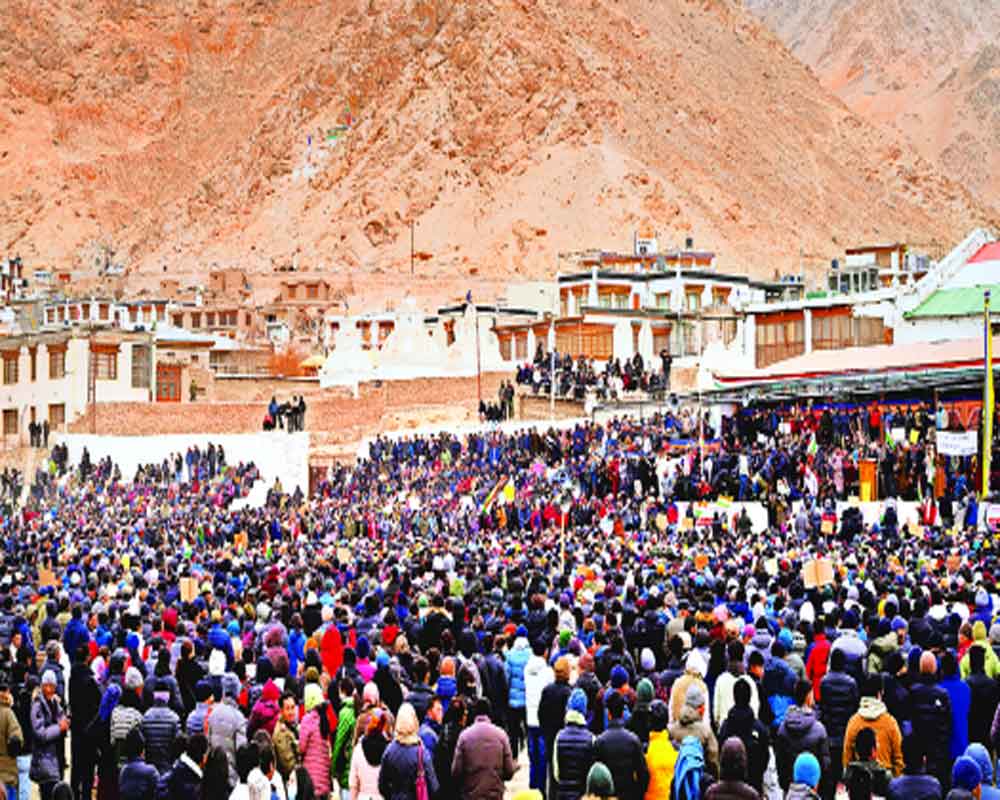Against the backdrop of historical marginalisation and neglect, Ladakh’s journey towards autonomy has been marked by struggle, negotiation and triumph
The accession of the erstwhile State of Jammu and Kashmir to India on October 26, 1947, inflicted significant socio-economic and political setbacks on the Buddhist-dominated Leh district in the strategic Trans-Himalayan Ladakh region, renowned as “the roof of the world” and “the land of the Lamas”. Likewise, the predominantly Buddhist Zanskar tehsil in the Karil district of Ladakh bore the brunt of these consequences, enduring even greater hardships than its counterpart, Leh.
The genesis of the Muslim-majority Kargil district in 1979 under Sheikh Abdullah’s leadership aimed at fostering discord between his co-religionists and the Buddhists, aiming to thwart the latter’s aspirations for autonomy and union territory status for Ladakh. This move exacerbated the plight of the Buddhists, imperilling their religion, culture, societal fabric and demographic integrity due to two primary factors.
Firstly, successive Kashmiri-dominated administrations viewed Ladakh as an appendage to Kashmir, disregarding the political and economic aspirations of its Buddhist populace. Ladakh, akin to Jammu province, was seen as a colony by Kashmiri rulers, perpetuating a sense of marginalisation among the Buddhists. Secondly, the pernicious influence of the Kashmiri elite over New Delhi’s corridors of power further marginalised the Buddhists’ voices, with central authorities consistently favouring Kashmiri interests and dismissing Ladakh’s concerns.
In response to this systemic neglect, under the astute leadership of Head Lama Kushok Bakula Rinpoche, the Buddhists initiated protests in 1952, demanding meaningful political representation and autonomy. Despite their fervent appeals and warnings, both Srinagar and New Delhi brushed aside their grievances, exacerbating disillusionment among the Buddhist populace.
The culmination of discontent erupted in October 1989, with widespread protests and clashes between Buddhists and authorities. The resultant Tripartite Agreement of October 29, 1989, brokered by the central Government, temporarily assuaged tensions by establishing the Ladakh Autonomous Hill Development Council (LAHDC) at Leh.
However, this resolution faced vehement opposition from Kashmiri leaders, including Farooq Abdullah, who viewed it as a threat to Kashmiri hegemony.
Despite the establishment of LAHDC Leh in 1995, the Buddhists remained dissatisfied due to continued interference from Kashmir-centric authorities, rendering the council ineffectual. Consequently, they intensified their agitation, advocating for Ladakh’s Union Territory status and other demands, citing central rule as the sole recourse to address their grievances.
The turning point came after June 19, 2018, when the central Government assumed direct control of Jammu and Kashmir, embarking on a series of measures to appease the Buddhist community. These included the establishment of the University of Ladakh, granting divisional status to Ladakh and ultimately, separating Ladakh from Jammu and Kashmir to fulfil the long-standing demand for Union Territory status.
Additionally, substantial budgetary allocations were made to bolster Ladakh’s development.
These initiatives underscored the efficacy of central rule in addressing the aspirations of the marginalised Buddhist population.
Rather than pursuing Statehood, the Buddhists are urged to strengthen LAHDC Leh and collaborate with the Modi Government to safeguard their cultural heritage and counter demographic challenges. The period between 2018 and 2023 epitomises a transformative phase for Ladakh, wherein central intervention proved instrumental in redressing historical injustices and empowering its Buddhist populace.
(The writer is former Dean of Jammu University’s Faculty of Social Science; views are personal)


























